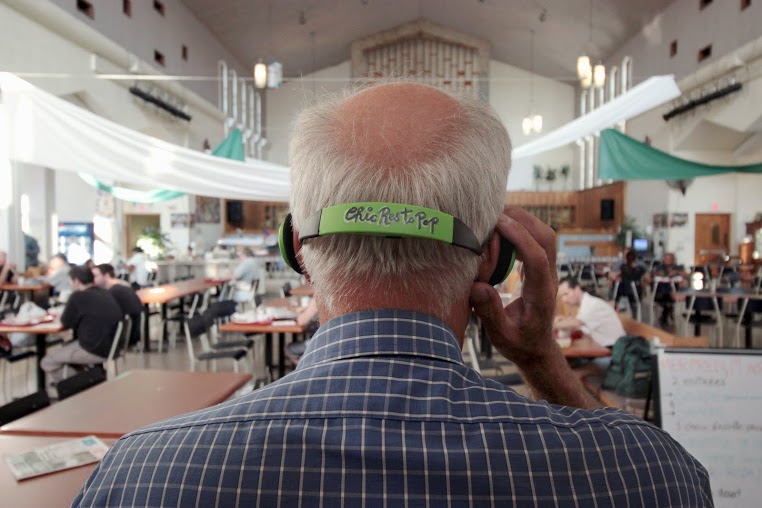Invisible guests: A sound installation in a Montréal community restaurant
DOI:
https://doi.org/10.15353/cfs-rcea.v4i2.220Keywords:
food insecurity, civic engagement, community wellness, sound art, art installation, community-based practices, relational art / sécurité alimentaire, implication citoyenne, bien-être communautaire, art sonore, installation artistique, pratiques communautaiAbstract
Invité.e.s invisibles (Invisible Guests) is a sound installation created in collaboration with a community restaurant that provides affordable meals to a disadvantaged population in Hochelaga-Maisonneuve, a former industrial neighbourhood in Montréal. Recorded conversations were made available for patrons who were eating alone, with the hope of breaking the social isolation experienced by some. By listening to the conversations on headphones as they were eating, patrons could virtually encounter other members of the community and engage with their concerns through hearing their stories. This is a first step toward group socialization for those who find it hard to communicate in person, and yet are eager to "share" their meals.
Invité.e.s invisibles est une installation sonore créée en collaboration avec un restaurant communautaire qui offre des repas abordables à une population défavorisée dans Hochelaga-Maisonneuve, un ancien quartier industriel de Montréal. Des conversations enregistrées étaient mises à la disposition de personnes venant y manger seules, dans l'espoir de rompre avec l'isolation que certain.e.s peuvent ressentir. Les conversations étaient diffusées sur des écouteurs que les gens pouvaient porter tout en prenant leur repas, ce qui leur permettait de rencontrer virtuellement d'autres membres de la communauté. En écoutant leurs récits, elles et ils pouvaient s'y reconnaître et se sentir investi.e.s des mêmes préoccupations. Cette installation pouvait servir de première étape vers la socialisation pour celles et ceux qui ont de la difficulté à communiquer en personne, mais qui désirent néanmoins «partager» leurs repas.
Photo Credit:
Invisible Guests. A participant listens to the sound installation at Le Chic Resto Pop. Photo par Patrick Ma. 2015. / Invité.e.s invisibles. Un participant à l'écoute de l'installation sonore au Chic Resto Pop. Photo par Patrick Ma. 2015.

Additional Files
Published
How to Cite
Issue
Section
License
Authors who publish with this journal agree to the following terms: Authors retain copyright and grant the journal right of first publication with the work simultaneously licensed under a Creative Commons License that allows others to share the work with an acknowledgement of the work's authorship and initial publication in this journal. Work published in CFS/RCÉA prior to and including Vol. 8, No. 3 (2021) is licensed under the Creative Commons CC BY license. Work published in Vol. 8, No. 4 (2021) and after is licensed under the Creative Commons CC BY-SA license. Authors are able to enter into separate, additional contractual arrangements for the non-exclusive distribution of the journal's published version of the work (e.g., post it to an institutional repository or publish it in a book), with an acknowledgement of its initial publication in this journal. Authors are permitted and encouraged to post their work online (e.g., in institutional repositories or on their website) prior to and during the submission process, as it can lead to productive exchanges, as well as earlier and greater citation of published work. (See more on Open Access.)



